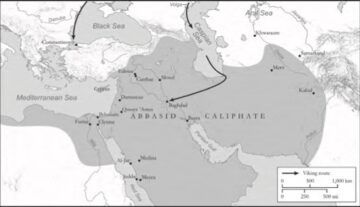Josephine Quinn at Literary Hub:
 In the eighth-century CE the Abbasids undertook to collect the wisdom of the world in their new capital at Baghdad. This project started with the second Abbasid caliph, al-Mansur (“the Conqueror,” r. 754–74), who commissioned Arabic translations of important scientific texts from Persian, Sanskrit, Greek, and Syriac (a late form of Aramaic), and came into its own under al-Ma’mun (“the Trusted One,” r. 813–33).
In the eighth-century CE the Abbasids undertook to collect the wisdom of the world in their new capital at Baghdad. This project started with the second Abbasid caliph, al-Mansur (“the Conqueror,” r. 754–74), who commissioned Arabic translations of important scientific texts from Persian, Sanskrit, Greek, and Syriac (a late form of Aramaic), and came into its own under al-Ma’mun (“the Trusted One,” r. 813–33).
The operation was lavishly funded by the caliph himself, as well as by members of his household, courtiers, merchants, bankers, and military leaders. It reflects the prosperity of the era, as the Abbasids created a powerful centralized government based on a land tax, which as conversion became more common they pragmatically extended to Muslims as well as non-Muslims.
The most important thing to understand about what is often now called the “Translation Movement” is that it wasn’t primarily about translation. It was part of a wider commitment by Islamic scholars and political leaders to scientific investigation that also saw caliphs commission new works of science, geography, poetry, history, and medicine.
More here.
Enjoying the content on 3QD? Help keep us going by donating now.
